By Carolyn McBride
This post was first published October 25, 2024, by Women Writers, Women Books at http://www.booksbywomen.org.
The winter of my life came in January 2021. Although I lived in the endless summer of sunny Florida, we were well into the pandemic by then, what seemed like an endless lockdown, and I was working from home in a bedroom right above my then-husband’s office. My department manager pulled me into a virtual meeting, and five minutes later, I had been laid off with nearly everyone else at my level in the biotech firm. This became the final nail in the coffin of my old life, a life that I could only lay to rest through writing.

Should I have started with a trigger warning? Some readers want one for the pandemic, but life doesn’t come with trigger warnings. Even if it had, I couldn’t have avoided the corporate layoff, the death of my mother, the revelations in my marriage, all the life quakes in quick succession that shook the foundation of my life in little more than a year’s time. Six months later, with my severance package dwindling and the ink drying on my divorce, I thought I was broken. The plot twist of middle age was finding myself jobless and alone.
I pretended I was okay. I thought if I could just keep moving forward—a new house, a new freelance copywriting business, a wonderful new man—the broken pieces inside me would come back together. I had tried prayer, therapy, plenty of wine, every comfort food I could binge, but I was still haunted by pain, guilt, and shame. I cried alone in my home office in the middle of the day as if I was dying of a disease. How was I going to heal myself back to health, physically and emotionally?
Fortunately, I decided to use my “spare” time rekindling my love of writing. I had always written to convey information, not as a release, and journaling had never interested me. When a university advertised a book incubator program to “write a book in a semester” with a target of 40K words, I signed up. Three months later, I had a 90K-word draft of my first novel, The Cicada Spring.
In How to Write an Autobiographical Novel, Alexander Chee writes, “I have a theory of the first novel now, that it is something that makes the writer, even as the writer makes the novel.” In writing fiction, I found that by putting my unresolved pain into my characters’ hands, I could gain perspective on it, resolve it—and release it. I could not ignore the pandemic’s universal impact on our lives and so I wove it into the journeys of my characters. My heroine, Katie, didn’t have the same experiences I did, but the emotions were still very real. She went through her own hell and found her way again, a coming-of-middle-age story arc.
I spent most of 2023 querying agents and receiving positive feedback, except for the request to remove the pandemic from the story line. In the end, keeping it real became the catalyst in my decision to independently publish the book in April 2024. I hired professional cover and interior designers through Reedsy and launched my own imprint, Make Waves Press, with the tagline Anchored in Strong Stories. The Cicada Spring has received a number of positive editorial reviews, including a Kirkus “Get It” recommendation, an Editor’s Pick from BookLife by Publishers Weekly, a five-star Reedsy Discovery review, and the short list for best cover in the Kindle Book Awards.
In Pilgrim at Tinker’s Creek, Annie Dillard describes how she learned to see the world with fresh eyes: “I had been my whole life a bell, and never knew it until at that moment I was lifted and struck.” As my bell rings, I write for all the women who have had the rugs pulled out from under them, who supported others until they lost their own identities, whose internal wells overflowed until they nearly drowned. Chee references Dillard’s bell differently: “Writing about the past was like submerging yourself in a diving bell: you took yourself down to the bottom of your own sea. You could get the bends.” What I thought were wasted years were wellsprings of insight, a midlife reframing.
I write for all the women who are ready to rewrite their own stories and discover the strength that lies within. My Happily Ever After is when Katie realizes, “For the first time, the vow she made was to herself.” At the halftime of her life, she reflects on the sum of her choices and makes new ones that will lead her to a life well lived, and well loved. Katie’s story continues in a rom-com novella titled Santa Overboard, published in September 2024. In this standalone sequel, the pandemic is ending (finally!) and Katie and her friends have a lot more fun, but not without some lingering baggage. Keeping it real.
I found my way through the darkness by writing. In the midst of recovering through my book babies, I stopped drinking, lost a hundred pounds, found love and remarried, became a first-time grandmother, and am halfway through an MFA in fiction writing at Lindenwood University. I live a life filled with creative moments and memories. This midlife metamorphosis has given me renewed energy, a purposeful livelihood, and a new set of dreams. You’re gonna need a battle cry to survive as a writer and so I leave you with mine. Go make waves!

